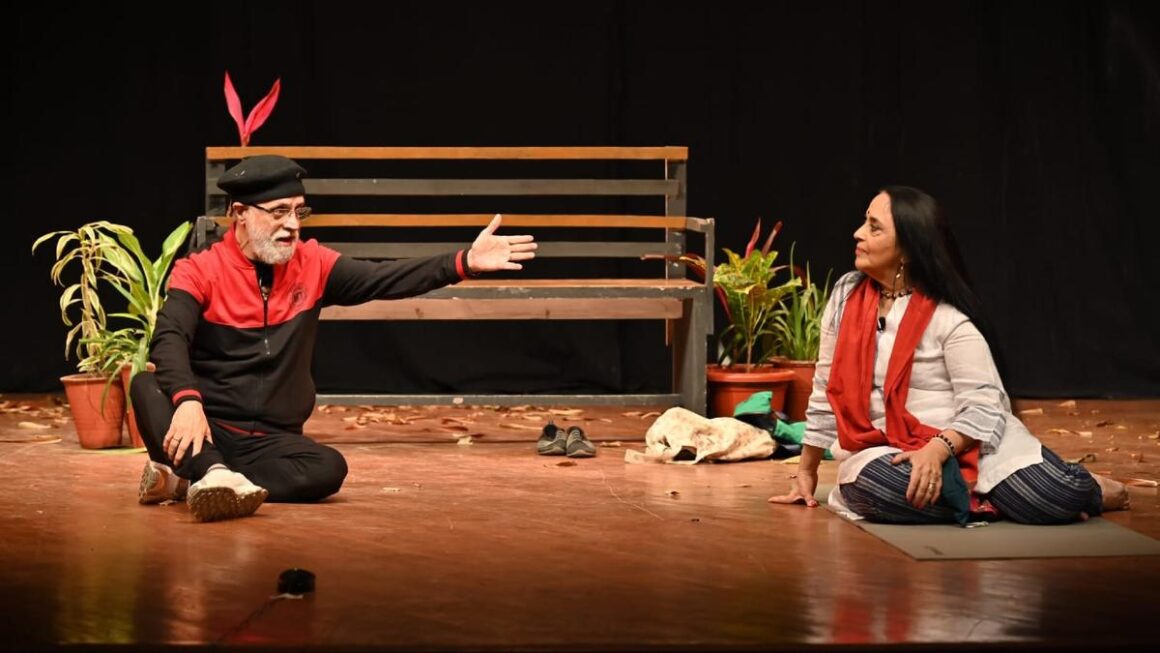
KK Raina with Ila Arun in a still from an earlier play
| Photo Credit: Special Arrangement
Surnai theatre and Folk Arts Foundation will stage the Hindi play Ajaatshatru in Bengaluru this weekend. The play, written by singer-actor-writer Ila Arun, is an adaptation of Henrik Ibsen’s An Enemy of the People. The play is jointly directed by actor KK Raina and Ila.
The play deals with the issue of water contamination and its effect on the inhabitants of the fictitious town of Sonpur. It is a play within a play starting with a folk play emphasising the tenets of the five elements — earth air, water, fire and space.
Ila founded Surna in 1982 with the twin objectives of promoting theatre and folk arts of India. It became a charitable trust ‘Surnai Theatre And Folk Arts Foundation in 2015 .
Raina, a television and theatre actor, and award-winning script writer, is known for his realistic portrayals in films including Ek Ruka Hua Faisla and Byomkesh Bakshi. He talks about theatre, people, pollution and personal choices.
Edited excerpts
‘Ajaatashatru’ means one who has no enemies, but the play is an adaptation of Ibsen’s An Enemy of the People. Is there a pun intended?
The credit for this goes to Ila. Ajaatashatru does mean one without enemies. Ibsen wrote An Enemy of the people in 1882. At that time as he concentrated on what was important at that point of time, the contaminants of water baths.
Ila’s adaptation talks about current issues of environmental pollution. The question is who is polluting the water bodies, beaches or the land? We talk about progress, but it cannot be mindless. Today, one rain leads to landslides in the mountains, because we have cut down the forests in the name of development and progress.
During Ganesh Chaturthi in Mumbai, idols are immersed in the sea with the flowers and the decorative paraphernalia. This pollutes the sea. However, idol immersion is not done by one person, but by all of us. Ajaatashatru says we are our own enemies. We need to be conscious about the choices we make today so we can leave a beautiful environment for the future generation.
Despite the awareness and the messages on so many platforms, the change does not seem to happen. What and where do you think we are going wrong ?
Attention spans are dead in today’s world. Ajaatashatru has four acts and we thought twice before staging it. The habit of listening has died as we are glued to our screens.
I am not condemning technology. It does help us, but becoming its slave is bad. We need to use it wisely. We talk about environmental pollution, but who is talking about intellectual pollution? This change has to begin at home. Nuclear families led to the alienation of children. Even if one hour is spent with children, you will know the direction they are heading towards. Despite this, if they don’t change then it is their choice.
You spoke about worrying about the length of a play, but theatre is known to be bold about its every aspect, irrespective of how the audience reacts to it? Or has that aspect of theatre changed?
Theatre cannot be devoid of society. The playwright looks at the society and writes about it. He questions the society and gives hints about where it is going wrong. That is his take and it is up to the audience, how they react to this.
Theatre is also a pillar of the society. People think theatre happens on stage. It is not so. Theatre happens in the minds of the audience. While they watch a play, the churning that happens in their minds is theatre. It forces them to think and question. If theatre fails to do so then it loses its essence of being theatre.
Theatre is also entertainment, as we must also learn to smile. Theatre has to make people laugh and think. In theatre the actor looks directly at the audience and talks to them. This connectivity is best for an actor and this is what has kept me coming back to it despite working in television and cinema.
Tell us about your experience of working with Ila Arun.
I feel I am lucky to work with her. I met her 40 years ago when I was working on the film Vijeyta. She was doing a folk play and it was very different. I told her that I wanted to join her and that led to these many years of friendship.
Her first original play was Riyaz. It was about the relationship between a man and a woman relationship. Ila used music as a metaphor, about how one needs practise or do riyaz for perfect music— same is the case with relationships.
She has written five original plays and adapted atleast eight of Ibsen’s plays. Her adaptations are so good that you feel it is an original. It is deeply rooted in our culture.
At Ranga Shankara, on December 15, 3.30pm and 7.30pm. Tickets are available on 111.bookmyshow.com and in the venue.
Published – December 12, 2024 11:33 am IST


Leave a Reply